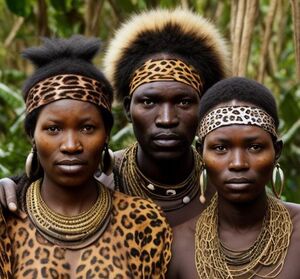Children of the Tambeki: Difference between revisions
No edit summary |
No edit summary |
||
| Line 1: | Line 1: | ||
The '''Children of the Tambeki''' (''Latin: Pueri Tambeki'') are a [[Hesperidesian Native]] cult that is predominately located in [[Hesperidesian Backlands|the Backlands]] of the [[Blackhelm Confederacy]]. Worshippers believe that the [[tambeki]] is a sacred animal, representing power and strength, and that by embodying its spirit they can gain control over the natural world. Its members are primarily from the [[ | The '''Children of the Tambeki''' (''Latin: Pueri Tambeki'') are a [[Hesperidesian Native]] cult that is predominately located in [[Hesperidesian Backlands|the Backlands]] of the [[Blackhelm Confederacy]]. Worshippers believe that the [[tambeki]] is a sacred animal, representing power and strength, and that by embodying its spirit they can gain control over the natural world. Its members are primarily from the [[Djujiba]] ethnic group, although other groups are also represented in their numbers as well. | ||
==History== | ==History== | ||
Latest revision as of 01:48, 10 July 2024
The Children of the Tambeki (Latin: Pueri Tambeki) are a Hesperidesian Native cult that is predominately located in the Backlands of the Blackhelm Confederacy. Worshippers believe that the tambeki is a sacred animal, representing power and strength, and that by embodying its spirit they can gain control over the natural world. Its members are primarily from the Djujiba ethnic group, although other groups are also represented in their numbers as well.
History
There is no clear date as to when The Children of the Tambeki was first formed, however they are recorded as existing in the Backlands as far back as 1902. It is likely that they existed in the jungle prior to that, but remained even more secluded as a result of the Hesperidesian Inquistion, which ended in the 1890's during the reforms following the Albandaean Crisis. The group still remains highly secluded, but have entered into the consciousness of the mainstream Blackhelm Confederate media as a result of several high profile incidents, such as the murder of Ilo Bulawayo and a number of defectors who have made their stories known.
Additionally, as a result of the ongoing, low-intensity Backlands Conflict, Confederate soldiers have encountered cult members on several occasions and brought stories of their practices back home with them.
Beliefs
Members of The Children of the Tambeki worship the tambeki as a kind of kind of representation of the spiritual world, and believe that the world of humanity is inherently corrupt. As such, adherents to this group feel that they must remain hidden in order to maintain their spiritual purity, building small communes in the dense jungles of the Backlands.
The group's activities mainly revolve around rituals to commune with the tambeki spirit. These rituals often involve the use of psychoactive plants and are performed at night, deep in the jungle. The cult also believes in the practice of blood sacrifice, usually of small animals, as a way to appease the tambeki spirit and gain its favor. They also believe that by performing these sacrifices, they will be granted the strength, power and protection of the tambeki.
The cult also has a strict code of conduct and members are expected to live in harmony with nature, avoiding any actions that might be harmful to the environment.
Structure
The Children of the Tambeki are led by a high priest or priestess, known as the Tambeki Keeper, who is believed to have a direct connection to the spirit of the tambeki. The current leader of the organaization and holder of the Tambeki Keeper title, Bante Gambingwe, is believed to have been given the title in 2019, following the death of the former Tambeki Keepr Kolo Chombari. The Tambeki Keeper is responsible for interpreting the "will of the tambeki spirit" and leading the members of the cult in their rituals and practices.
Beneath the Tambeki Keeper, there is a group of elders and shamans who are considered to be the most experienced and knowledgeable members of the cult. These elders are responsible for performing the rituals and ceremonies of the group, and for providing spiritual guidance to the other members.

